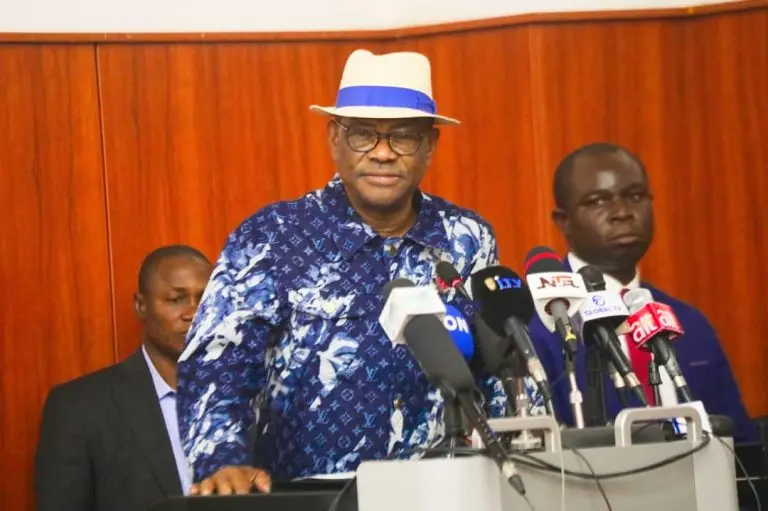The federal high court court in Abuja has issued an injunction preventing the Minister of FCT, Nyesom Wike, and the Federal Capital Development Authority (FCDA) from encroaching upon the Centenary Economic City Free Zone located along Airport Road, Abuja.
In a legal ruling, Justice Inyang Ekwo issued an injunction order preventing the Federal Capital Territory Administration (FCTA) and Arab Contractors (OAO) from any further encroachment on the specified site.
Justice Ekwo additionally issued an order nullifying and completely overturning all executive actions, measures, decisions, and administrative controls related to the forceful encroachment of the premises by OAO, carried out under the instructions of the Minister, FCTA, and FCDA, without prior consent from the plaintiffs and the overarching approval of the Nigeria Export Processing Zones Authority (NEPZA).
The judge determined that the encroachment was in direct violation of Sections 4 and 13 of the NEPZA Act Cap N107 LFN 2004, as well as the stipulations of Section 5 (3) of the 1999 Constitution (as amended). Consequently, it was deemed unconstitutional, illegal, unlawful, void, and entirely ineffective.
He also made an injunction order restraining them from exercising any executive or regulatory control on the zone, “which occupies the land, measuring 1,264.78 hectares with beacon coordinates: PB57-PB59, PB60-PB69, PB70-PB79, PB80PB89, PB90-PB99, and PB1000-PB104, located at Airport Road, Wawa District, Cadastral Zone E24, FCT, Abuja.”
“An order is hereby made directing Arab Contractors (OAO) Nigeria Limited, to immediately vacate the portion of the Centenary Economic City Free Zone, which it illegally occupies at the instructions of the 5th, 6th, and 7th defendants against the provisions of Sections 4 and 13 of NEPZA Act, without the express approval of the NEPZA,” he added.
Hence, Justice Ekwo directed Arab Contractors to compensate the plaintiffs with a sum of N100 million for the intrusive invasion and destruction of the zone’s master plan, developed by Eagle Hills Properties LLC of the United Arab Emirates (UAE), at a cost of $35 million. In addition, the judge mandated the company to pay N50 million as general damages and N5 million to cover the costs of the legal action.
He also mandated an interest rate of 10 percent per annum on the entire judgment amount, starting from the moment of the judgment delivery until the construction firm fully settles the entire judgment sum.
The certified true copy of the judgement, delivered on Feb. 6, was sighted by the News Agency of Nigeria (NAN) on Monday.
“Land measuring 1,264.78 hectares was allocated to Centenary City Pic., for the development of the Centenary City in the FCT, following a development agreement entered with the FCTA,” he said.
He said the recommendation made by the the minister of Trade for the designation of 1,264.78 hectares of land at Wawa District, as the Centenary Economic City Free Zone, FCT, Abuja, was approved by the Presidency.
“The said approval was also communicated to the Managing Director, Centenary City Plc., via a letter dated 16th September, 2014.
“Upon the fulfilment of statutory requirements, a certificate was issued by the NEPZA, licensing Centenary Economic City as a Free Zone.
“The 2nd plaintiff was also issued an operating license,” he said.
The Managing Director reported that Eagles Hills Properties LLC designed the Centenary Economic City Free Zone. Nevertheless, he accused the Federal Capital Territory Administration (FCTA) of unauthorized actions, asserting that, without NEPZA’s permission, the FCTA instructed Arab Contractors to convert portions of the Free Zone land into their site yard. Odenigwe further claimed that Arab Contractors defaced and damaged the master plan of the Centenary Economic City Free Zone.
The Managing Director informed the court that the company’s actions posed a threat to the assets and investments of the Federal Government. He argued that granting the requested reliefs was essential for the interest of justice. While the president, Attorney General of the Federation (AGF), and Minister of Trade did not submit any documents, NEPZA contended that the plaintiffs had not presented any substantial cause against it.
In their opposing affidavit, the 5th, 6th, and 7th defendants contended that the plaintiffs did not hold allotment rights for all the land parcels. They asserted that, according to the certificate of occupancy issued by the then FCT minister, Centenary City Plc was the allottee, not any of the plaintiffs. Additionally, they argued that the plaintiffs were not the allottees of the NEPZA-issued license.
Furthermore, they stated that the establishment of Centenary City as a Free Zone did not diminish the authority of FCDA within the zone. They insisted that both the plaintiffs and NEPZA failed to involve FCTA and FCDA in the process.
According to them, the master plan of the FCT supersedes any other plan by any individual, including the plaintiffs and NEPZA.
They contended that they allocated a portion of the land to the company due to the firm being awarded the contract for the expansion of a road connecting Kuje Community to Airport Road.
In the judgment, Justice Ekwo asserted that the plaintiffs successfully presented their case through the exhibits provided and in accordance with the provisions of Sections 5 (1) (a) and (b), (2), and (3) (a) and (b), 147, 148, 299 (a) and (b) of the 1999 Constitution (as amended); Sections 4, 8, 10 (1) and (2), and 13 of the NEPZA Act, and Section 19 of the FCT Act.
“The plaintiffs are therefore entitled to the claims sought in this case, and I so hold,” he said. (NAN)



